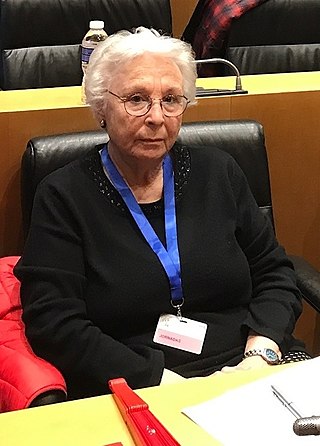
Silvia Pinal Hidalgo is a Mexican actress. She began her career in the theater, venturing into cinema in 1949. She is one of Mexico's greatest female stars, one of the last surviving major stars from the Golden Age of Mexican cinema and part of the Golden Age of Hollywood for her film Shark! (1969). Her work in film and popularity in her native country led Pinal to work in Europe. Pinal achieved international recognition by starring in a famous film trilogy directed by Luis Buñuel: Viridiana (1961), El ángel exterminador (1962) and Simón del Desierto (1965).

Angélica María Hartman Ortiz, known professionally as La novia de Mexico, is a Mexican actress and singer. Her songs El hombre de mi vida peaked at No. 6, Reina Y Cenicienta peaked at No. 9, Prohibido (Prohibited) peaked at No. 13, and El Taconazo peaked at No. 34 on the hot Latin songs chart.

The Three-Cornered Hat is a ballet choreographed by Léonide Massine to music by Manuel de Falla. It was commissioned by Sergei Diaghilev and premiered in 1919. It is not only a ballet with Spanish setting but one that also employs the techniques of Spanish dance instead of classical ballet.

Castanets, also known as clackers or palillos, are a percussion instrument (idiophone), used in Spanish, Calé, Moorish, Ottoman, Italian, Mexican, Sephardic, Portuguese and Swiss music. In ancient Greece and ancient Rome there was a similar instrument called the crotalum.

Olga Breeskin Torres is a Mexican violinist, dancer and actress. She was one of the most famous Mexican vedettes in 1970s and 1980s. Since her conversion to Christianity, she has only presented herself as a violinist.
María Isabel Martín Martínez, better known as Maribel Martín, is a Spanish actress.

María del Pilar Pellicer López de Llergo was a Mexican actress. At the 17th Ariel Awards, she won the Ariel Award for Best Actress for her performance in the film La Choca (1974).
Aurora Clavel is a Mexican film and television actress who is noted for her roles in the movies Tarahumara (1965) and Once Upon a Scoundrel (1973), as well as in numerous telenovelas. For example, she played Mama Lupe in Mariana de la Noche. She belongs to the last decade of the Golden Age of Mexican cinema and to the last decade of the Classical Hollywood cinema.
Enrique Lucero was a Mexican actor who appeared in over 120 film roles. He was nominated for the Ariel Award for Best Actor for his role in the film Canoa: A Shameful Memory (1976).

Josefina Molina ReigMMT is a Spanish feature film director, screenwriter, TV producer and scene director. She was one of the first female directors in Spain and is also known for directing such notable feature films as Función de noche (1981) and Esquilache (1988), as well as the television series Teresa de Jesús (1984). Esquilache was entered into the 39th Berlin International Film Festival. Teresa de Jesús won several awards, including the Antena de Oro (1984), and the TP de Oro.
María Dussauge Ortiz, commonly known as María Duval, is a Mexican actress and singer who has worked in film, television, and the stage.

Alfonso Arau Incháustegui is a Mexican filmmaker and actor. He worked as an actor and director in both Mexican and Hollywood productions for over 40 years, before his international breakthrough with the 1992 film Like Water for Chocolate, based on his wife Laura Esquivel's novel of the same name. His other films include A Walk in the Clouds (1995), Picking Up the Pieces (2000), The Magnificent Ambersons (2002) and Zapata: El sueño del héroe (2004). He is a five-time Ariel Award winner, including Best Director for Like Water for Chocolate, and a BAFTA nominee.

María Sonia Furió Flores was a Spanish-born Mexican actress.

María del Rosario Mendoza Chávez was a Mexican vedette, actress, dancer, and singer. During the 1970s–1980s, she was one of the highest grossing artists in the Mexican sex comedy film genre.
Mimí Bechelani was a Mexican actress, writer, and screenwriter. She had spent her entire career writing for Televisa. Bechelani was also a radio announcer, as well as a writer of poetry, novels, dramas, films, and theater scripts, for radio, TV, theatre and film industry.

Anita Blanch was a Spanish-born, Mexican actress, who worked in the Golden Age of Mexican cinema. She was nominated for an Ariel Award from the Mexican Academy of Film three times and won the Best Supporting Actress Award from Diosa de Plata in 1963.

Gloria Evangelina Elizondo López-Llera was a Mexican actress and singer from the Golden Age of Mexican cinema. She starred in movies, television and theater. She was an accomplished artist having studied at the National School of Painting and had a degree in theology. She wrote two books and recorded numerous albums. In 2014, she received a Premios Arlequín for her contributions to Mexican culture.

Rita Macedo was a Mexican actress and dressmaker. She was nominated for an Ariel Award for her 1956 performance in "Ensayo de un crimen" and in 1991 for a TVyNovelas Prize for "Alcanzar una estrella". She won the Best Actress Ariel Award in 1972 for "Tú, yo, y nosotros". She was married to a pioneer of Mexican radio, television and film, Luis de Llano Palmer, by whom she had two children, Julissa, an actress and musician, and Luis de Llano Macedo, renowned telenovela producer. She also was instrumental in bringing many works of international writers to the Mexican stage.

Eugenia León is a Mexican singer. In 1985, she won first place at the prestigious OTI Festival in Seville, Spain with the theme "El Fandango Aquí" by Marcial Alejandro. A recipient of the Latin Grammy Lifetime Achievement Award, she has had a career spanning more than 35 years and 26 recorded albums, of which several million copies have been sold. She has performed in some of the most important venues in Mexico, such as the Palacio de Bellas Artes, the Auditorio Nacional, the Sala Nezahualcóyotl, the Teatro de la Ciudad, and the Cervantino Festival.
María Teresa Rivas was a Mexican actress. Along with Silvia Derbez, she is considered one of the pioneers of telenovelas in Mexico, appearing in more than 50 in her career, beginning with an iconic villain role in Gutierritos (1958).














